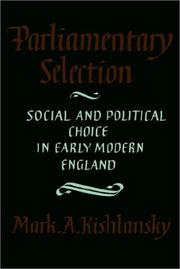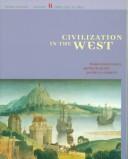| Listing 1 - 10 of 12 | << page >> |
Sort by
|

ISBN: 0521311160 0521322316 0511522649 Year: 1986 Publisher: Cambridge : Cambridge University Press,
Abstract | Keywords | Export | Availability | Bookmark
 Loading...
Loading...Choose an application
- Reference Manager
- EndNote
- RefWorks (Direct export to RefWorks)
Parliamentary Selection examines the process by which members of Parliament were chosen in the period between the reigns of Elizabeth I and William III. By focusing on the nature of the selection process, rather than on its results, Professor Kishlansky uncovers a fundamental transformation in assumptions about political behaviour in the early modern period. Until the time of the English Revolution, selection of members of Parliament was a social process dominated by concern about rank and status, personal honor, and community solidarity. County elites organized their selections to reflect the realities of their local social structures, accounting for the influence of the county peerage and greater gentry. Borough elites used local patrons, officeholders, and denizens for nominations to their places. In both county and borough the principle of parliamentary selection was non-competitive choice.
Elections --- History --- England and Wales. --- Great Britain --- Politics and government --- Electoral politics --- Franchise --- Polls --- Political science --- Politics, Practical --- Plebiscite --- Political campaigns --- Representative government and representation --- Great Britain. --- England. --- Arts and Humanities

ISBN: 0521273773 0521227518 0511528612 Year: 1979 Publisher: Cambridge : Cambridge University Press,
Abstract | Keywords | Export | Availability | Bookmark
 Loading...
Loading...Choose an application
- Reference Manager
- EndNote
- RefWorks (Direct export to RefWorks)
This is a meticulously-researched and highly controversial study of the origins and development of parliamentary and extra-parliamentary politics during the English Civil War. Professor Kishlansky challenges the fundamental assumptions upon which all previous interpretations of this period have been based. It is his contention that during the years 1643-6, Parliament operated on a model of consensus rather than on one of party conflict as has been traditionally assumed. The New Model Army was thus the product of compromise and, Professor Kishlansky argues, it embodied the ideology that created it. The political invention of the Army occurred only after the machine of consensus politics had broken down with Parliament. The New Model Army, perpetuating the belief in consensus and balance but also representing its own interests, then became one of many factions competing for dominance.
Arts and Humanities --- History --- Great Britain. --- Great Britain --- Angliǐskai︠a︡ Armii︠a︡ --- Tsava ha-Briṭi --- British Army --- בריטניה. --- צבא הבריטי --- England and Wales.
Book
ISBN: 0713990686 Year: 1996 Publisher: London Lane The penguin press
Abstract | Keywords | Export | Availability | Bookmark
 Loading...
Loading...Choose an application
- Reference Manager
- EndNote
- RefWorks (Direct export to RefWorks)
Book
Year: 1979 Publisher: Cambridge University Press
Abstract | Keywords | Export | Availability | Bookmark
 Loading...
Loading...Choose an application
- Reference Manager
- EndNote
- RefWorks (Direct export to RefWorks)

ISBN: 9780511528613 9780521227513 9780521273770 Year: 1979 Publisher: Cambridge Cambridge University Press
Abstract | Keywords | Export | Availability | Bookmark
 Loading...
Loading...Choose an application
- Reference Manager
- EndNote
- RefWorks (Direct export to RefWorks)
Book
ISBN: 9780511522642 9780521322317 9780521311168 Year: 1986 Publisher: Cambridge Cambridge University Press
Abstract | Keywords | Export | Availability | Bookmark
 Loading...
Loading...Choose an application
- Reference Manager
- EndNote
- RefWorks (Direct export to RefWorks)
Book
ISBN: 0719046955 Year: 1995 Publisher: Manchester Manchester University Press
Abstract | Keywords | Export | Availability | Bookmark
 Loading...
Loading...Choose an application
- Reference Manager
- EndNote
- RefWorks (Direct export to RefWorks)
Book
ISBN: 0673466043 Year: 1993 Publisher: London Harper Collins
Abstract | Keywords | Export | Availability | Bookmark
 Loading...
Loading...Choose an application
- Reference Manager
- EndNote
- RefWorks (Direct export to RefWorks)

ISBN: 0673992268 Year: 1995 Publisher: New York HarperCollins College Publishers
Abstract | Keywords | Export | Availability | Bookmark
 Loading...
Loading...Choose an application
- Reference Manager
- EndNote
- RefWorks (Direct export to RefWorks)
History of civilization --- Western world --- Civilization [Western ] --- History

ISBN: 0673985253 Year: 1998 Publisher: New York Longman
Abstract | Keywords | Export | Availability | Bookmark
 Loading...
Loading...Choose an application
- Reference Manager
- EndNote
- RefWorks (Direct export to RefWorks)
| Listing 1 - 10 of 12 | << page >> |
Sort by
|

 Search
Search Feedback
Feedback About UniCat
About UniCat  Help
Help News
News